What makes great online marketplaces different today? Successful modern marketplaces compete not only on the way they connect buyers and sellers but also on the quality of goods and how customers can discover them based on crucial attributes they use in their searches. So it's not just about the goods — it's about the experience. And AI-driven tools are paving the way for this evolution by increasing efficiency and personalization at every touch point.
AI-powered marketplace listings are at the heart of this transformation, redefining the way marketplaces operate. Driven by AI, these tools can do everything from composing attractive product descriptions to optimizing pricing strategies and choosing the best visuals.
Codica’s experts believe that there is a huge potential for AI in real estate marketplaces, as well as in industries like ecommerce, procurement, healthcare, education, travel, and logistics. Because such tools resolve real customers' problems and make complicated workflows simpler, they let marketplaces reach better, smarter, and faster outcomes.
Curious to understand how AI-driven marketplace trends are changing online shopping? Let's begin.
What are AI-powered marketplace listings, and what's special about them
AI-powered marketplace listings are intelligent tools that revamp the way how products and services are presented online, offering automation and personalization far beyond the capabilities of traditional ones. While traditional static listings rely on human input, AI-driven ones achieve this by using NLP technologies and machine learning for marketplace listings.
Integrated seamlessly into modern marketplace design, they take the headache out of managing online marketplaces by automating important routine tasks, for example:
- Writing clear and appealing descriptions;
- Suggesting the best product photos;
- Changing prices based on demand;
- Showing buyers what they need;
- Helping sellers improve their listings;
- Keeping listings updated automatically;
- Spotting and blocking suspicious activity;
- Making listings work in any region.
The one thing that makes AI-driven marketplace tools special is that they are able to analyze a huge amount of data: customer preferences, the seasonality of trends and the behavior of competitors. This keeps the listings optimized. According to a 2021 report, 76% of shoppers would love a personalized experience, and AI makes the marketplace journey customized and effortless for both buyers and sellers:
- For sellers, AI-powered listings save time by automating mundane operations and enable focusing on business growth. These tools recommend ideal pricing and show the most appealing visuals to help listings stand out. No surprise that 90% of marketers agree that personalization drives profitability.
- To shoppers, it's all about personalized product recommendations: AI tailors them to their taste, making it really quick to find exactly what they are looking for. A recent study by the Boston Consulting Group found that four-fifths of consumers worldwide are comfortable with personalized experiences, and most expect companies to provide them.
At their core, AI-powered listings enable marketplaces to operate smarter, faster, and with greater focus on users.
Read also: AI in Ecommerce: Statistics, Use Cases, and Benefits
Core functionalities of AI-powered listings
Let's see in more detail how AI-powered marketplace listings work and why they make such a difference.
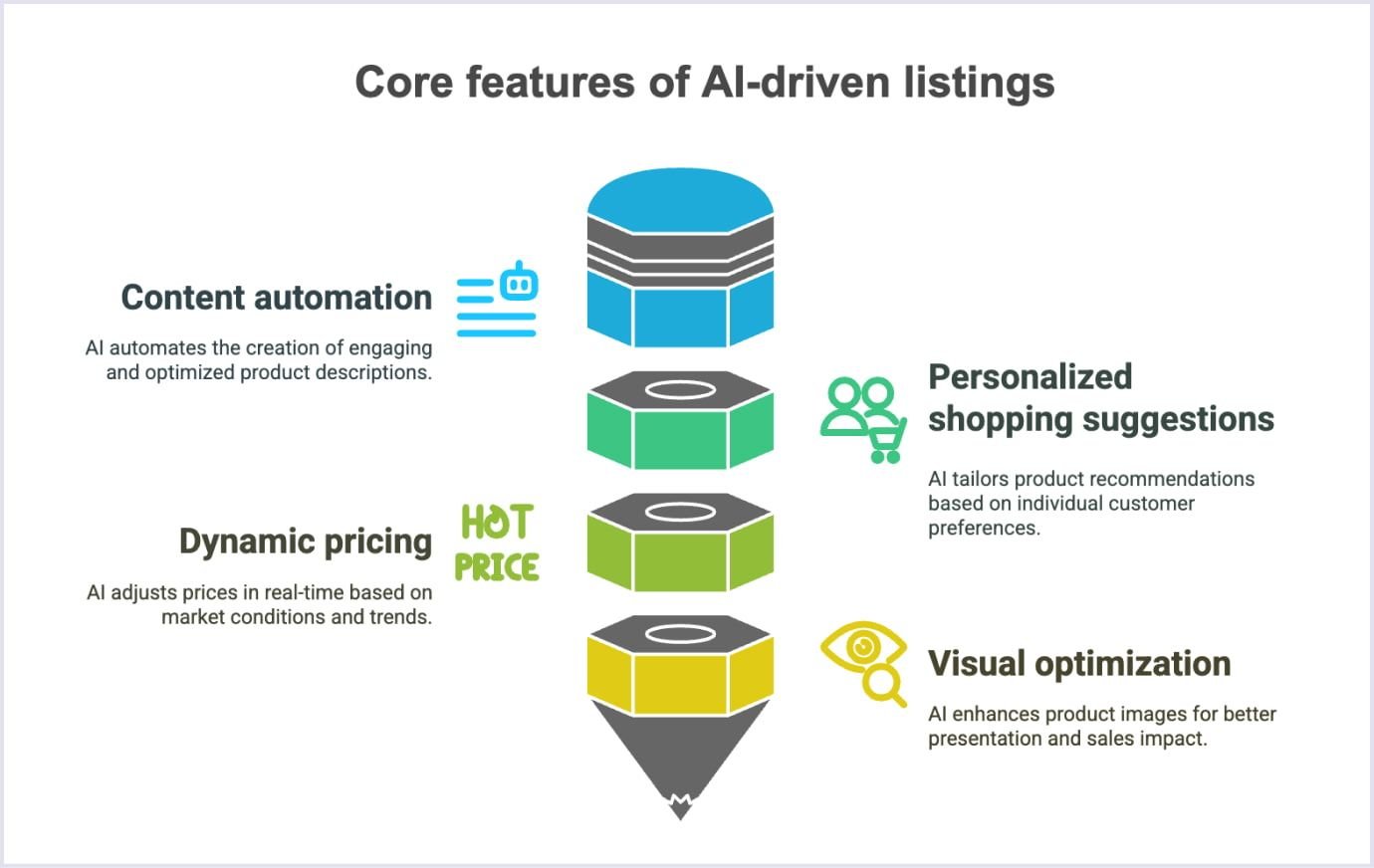
Content automation
Creating listings can be tedious, but AI takes care of it in seconds through AI-driven content automation. It writes detailed, engaging descriptions, picks the right keywords to help items show up in search results, and even suggests competitive pricing. For example, if you’re selling a desk, AI might highlight features like “space-saving design” or “perfect for remote work” based on what’s popular with buyers. This means sellers save time while buyers get clear, helpful information.
Personalized shopping suggestions
AI makes shopping personal through AI-personalized shopping by learning the likings of every customer and suggesting just that. If a user has been browsing hiking boots, the system may suggest waterproof backpacks or trekking poles. It's like having a personal shopping assistant who knows exactly what you want, so it's quicker and more pleasurable.
Dynamic pricing
Markets change every day, while AI keeps the seller in the race. It adjusts prices based on demand, competition and performance - smartly increasing the price of trending items and discounting during the slow season. On Black Friday, it automatically lowers the price of the most in-demand gadgets to ensure maximum sales.
Visual optimization
Great visuals sell products, and AI ensures each listing looks its best. It can recommend better angles, improve poor lighting, or remove distracting backgrounds. For example, marketplaces leveraging AI visual optimization tools might suggest replacing a poorly lit picture of a watch with a sharper, professional one. These enhancements will make for better grabs, instill confidence, and move people to click "buy”.
Being competitive today means embracing advanced AI development services, which unlock the full power of AI-powered listings for greater value.

Benefits for sellers and shoppers
AI-powered marketplace listings offer more than just tools for personalization and automation - they are driving fundamental changes to the way marketplaces operate. Let's explore some benefits that make this tool indispensable to modern platforms.
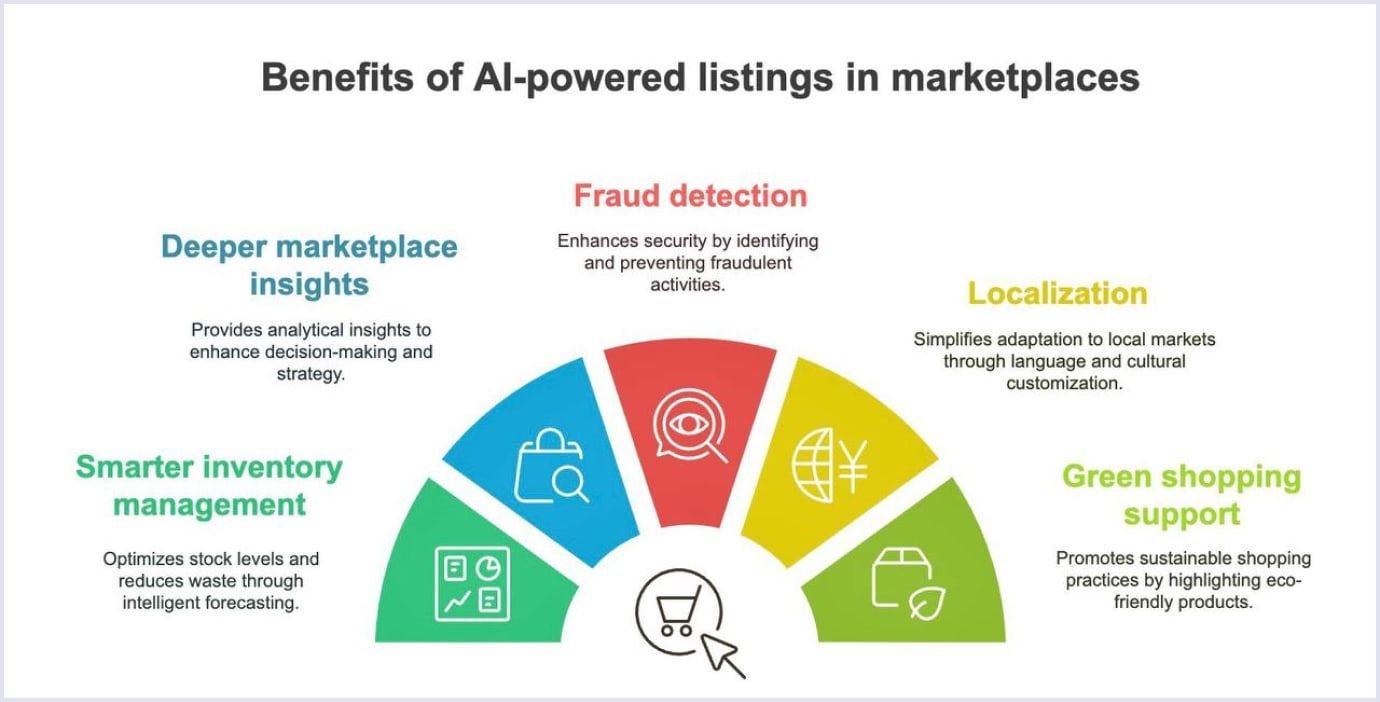
Smarter inventory management
AI does not just optimize listings - it optimizes inventory management. AI predictive analytics marketplaces analyze real-time sales patterns and demand for stock to predict shortages in advance and warn sellers.
For example, if seasonal trends show that outdoor gear is about to spike in demand, the system can suggest stocking up on popular items like hiking boots. Also, in cases where something is out of stock, AI can suggest some similar products to buyers and allow seamless shopping without dead ends.
Deeper marketplace insights
AI insights in listings are the gold mine of data, signaling to sellers and marketplace operators what is trending and at what price - our input for smarter business decisions.
The study found that keyword readability is positively correlated with sales, as is keyword inclusivity in terms of both customer and brand characteristics. This insight goes far beyond listing perfection and encourages approaches to comprehensive growth strategies.
Fraud detection
Fraud is increasingly a challenge within marketplaces, for which AI is rising to combat. Analyzing user behavior and patterns, AI will flag suspicious activities such as fake reviews or duplicate listings.
For example, if there is a sudden surge of just five-star reviews with the same phrasing on a particular listing, AI can catch that before buyers are misled. This not only helps protect the reputation of the platform but builds trust with users relying on the accuracy of the information.
Localization
With AI-powered marketplace listings, expanding into new markets is no longer a headache. These tools automatically translate descriptions, adjust prices for local currencies, and even recommend visuals that resonate with specific cultures.
For example, the same marketplace of furniture entering Japan might feature images of compact, minimalist designs that fit smaller living spaces. This localized approach makes global expansion seamless while ensuring a personal touch for every buyer.
Green shopping support
The modern customer is concerned about the environment, and AI is here to help marketplaces be in step with such thinking. AI inspires green purchases through the pushing of eco-products in recommendations. For example, when buyers search for home appliances, they can be shown energy-efficient options first, reflecting a marketplace's commitment to sustainability while meeting consumer demand for responsible products.
AI-powered listings are not about efficiency alone but about creating smarter, more adaptive, and trustworthy marketplaces that meet the needs of buyers and sellers alike. Marketplaces that can operate with adaptations like inventory prediction, fraud detection, localization, and more are set to thrive in this ever-changing digital frontier.

Use cases of AI-powered marketplace listings
Why does AI matter across industries?
AI-driven tools don't just make things faster, they make them smarter. Process automation, data insights and personalization are creating a whole new paradigm for industries to work towards, setting new standards for efficiency and satisfaction. And as businesses continue to adapt to these innovations, the possibilities for improvement are endless.
Let's find out how companies across a range of industries are using AI-driven technologies to transform their listings for a better user experience.
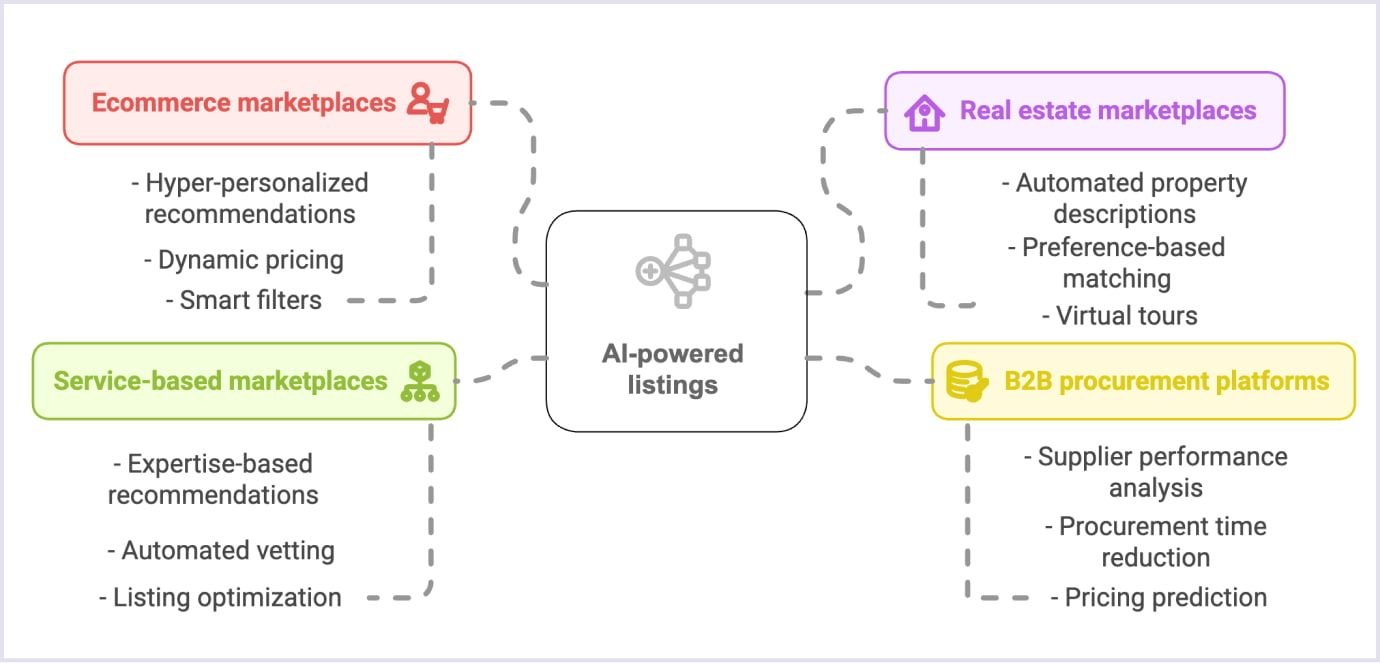
Ecommerce marketplaces
AI-powered engagement in ecommerce is seriously boosting levels of user engagement and, in turn, sales. Global revenue from AI-powered marketing tools will reach $107 billion by 2028, according to Statista. Here's how leading platforms are using AI to add value:
- Amazon. It uses AI to suggest related products based on customer purchase history and browsing behavior. Its AI also drives dynamic pricing models that are competitive enough.
- eBay. Uses AI in the search engine for dynamic search filtering, ranking relevant listings for buyers.
- Shopify. Allows merchants to use AI technology with tools such as automated product description generators to increase their listing opportunities.
Real estate marketplaces
AI is constantly changing the real estate industry, and 14% of real estate companies are using AI in their business, while another 28% are actively exploring the use of AI. The leading property platforms make use of AI in a variety of ways to further improve operations and user experience:
- Zillow. Leverages generative AI to produce property descriptions based on neighborhood information, architectural features, and amenities. Its AI-powered tool, the Zestimate, predicts property values highly accurately.
- Redfin. Offers listings with virtual tours and image analysis through the use of AI to make buying easier for shoppers. They also offer personalized recommendations of homes based on user preferences.
- FindRealtor. Uses AI to match buyers with properties that fit their lifestyle and budget for efficient property discovery.
B2B procurement platforms
AI is set to dramatically improve the efficiency of B2B procurement platforms. A 2023 survey found that 44% of procurement decision-makers recognize the potential of AI for faster and deeper data analysis. Leading platforms exemplify this trend:
- Alibaba. AI-driven matching of buyers to suppliers, including recommendations of the best sourcing options and price strategies.
- Coupa. AI analyzes procurement habits, matches businesses with suppliers, and automates inventory management.
- ThomasNet. Their B2B marketplace AI tools recommend suppliers by analyzing industry needs, certifications, and performance metrics, ensuring tailored and efficient solutions.
Service-based marketplaces
Gartner states that by 2025, 80% of customer service and support organizations will be using generative AI to improve agent productivity and customer experiences.
- Upwork. This platform has incorporated AI into matching freelancers with clients based on the project requirements, skill set, and performance history.
- Thumbtack. It analyzes the credentials of service providers, reviews, and customer preferences to optimize listings and recommend top matches.
- Angi (formerly Angie’s List). Uses AI to screen service pros, improve the visibility of their listings, and ensures that the users are connected with the top-rated professionals to fit their needs.
Overcoming the challenges of AI-powered listings: practical solutions
However, there are some challenges in dealing with AI-powered listings in marketplaces. Well, this is good news because these issues can be solved with the right approach and the overall integration will be smooth.
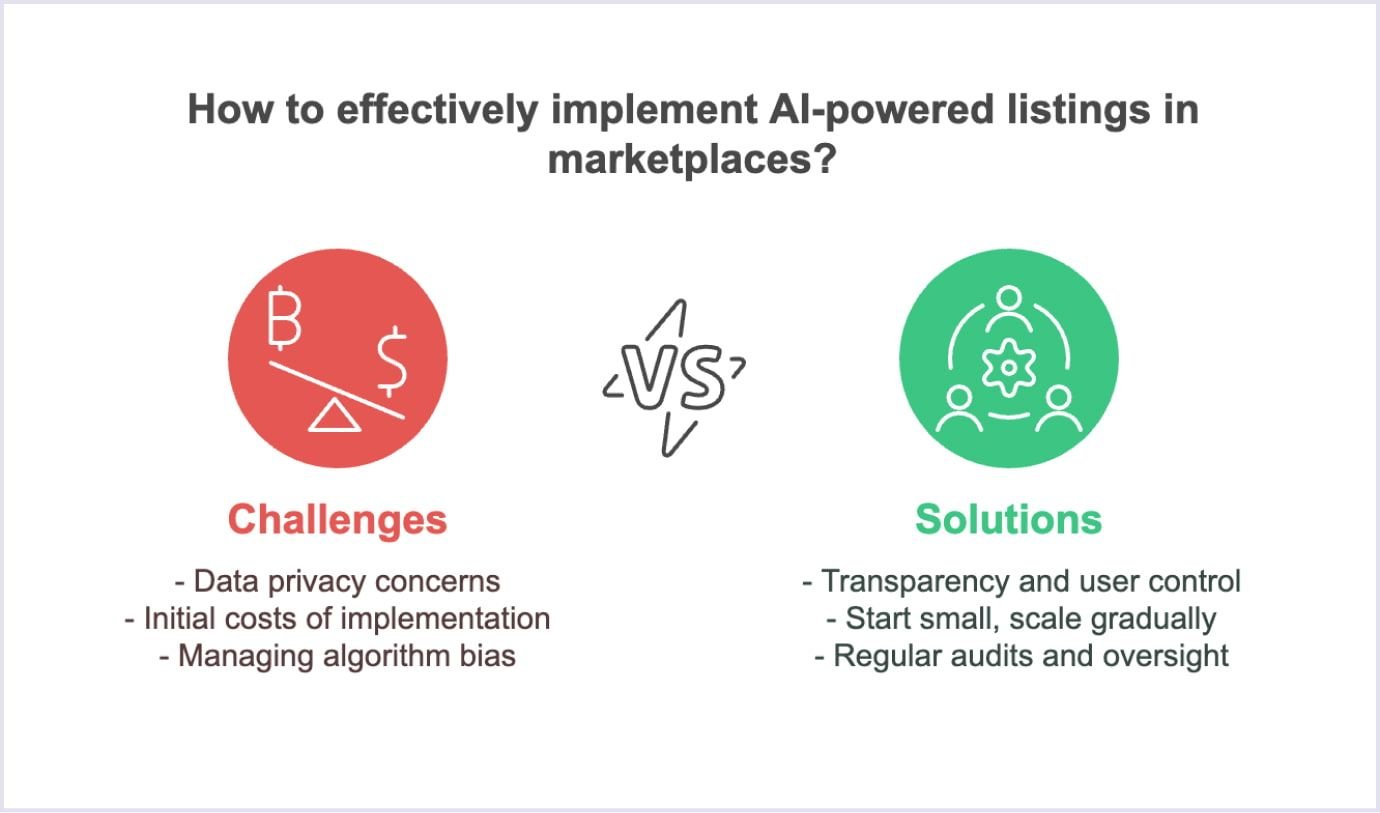
Challenge 1: Data privacy concerns
As AI operates on vast ranges of user information to provide them with better recommendations and experiences, this raises concerns for users over the collection, usage, and protection of their data. The development of more restrictive legislation, such as the General Data Protection Regulation and the California Consumer Privacy Act, means heightened levels of transparency and user control in personal data, but conversely does place additional compliance burdens on companies seeking to utilize AI offerings.
Solution
You need to be clear about how and why you collect user data and provide control over privacy settings. Use measures such as encryption and anonymization to ensure privacy, and make sure your practices don't violate local privacy laws to build trust.
Challenge 2: High initial costs of implementation
The costs of implementing AI can be pretty high since a company has to invest in the infrastructure, the training of the system, and further maintenance over the long term. This could be even more overwhelming for small businesses. Quick returns on investment are usually hard to see.
Solution
Start with small, manageable changes in one or two areas, such as customer support or better search results. Use more affordable cloud-based AI tools that reduce the need for up-front investment, and monitor results to see how AI pays for itself over time.
Challenge 3: Algorithmic bias control
AI learns from data, and if that data is biased - underrepresented or stereotypical - it leads to unfair judgments. This can take the form of some people getting better recommendations than others, or certain products not being shown to everyone equally.
Solution
Use diverse and balanced data to train AI. Monitor your system's performance regularly to identify and correct any bias. Human review of key decisions can also be added to ensure fairness and inclusiveness of results.
The future of AI-powered marketplace listings
AI-powered listings are about to change the very character of marketplaces, making possible what was earlier the stuff of science fiction.
- Augmented reality is going to change how people interact with products. For example, IKEA lets you see how furniture will look in your home using their AR app. Sephora lets you virtually try on makeup. It takes the guesswork out of shopping and makes feeling confident about your purchases a lot easier.
- Predictive analytics takes personalization completely to a different level. Amazon uses this technology in recommending products based on your browsing habits and past purchases, often showing you just what you need before you realize you need it. It's like having a personal shopper who knows you better than you know yourself.
- Voice-enabled shopping is now truly becoming a lifesaver for convenience. From integrations by the likes of Walmart with Alexa to Target with Google Assistant, users have been spoiled - just to say hey to a bot and easily reorder some groceries or get some new things you may be looking for on this busy day.
These are only just the beginning. AI-powered listings will make marketplaces smarter, more intuitive, and better at giving people precisely what they need. Businesses that adopt these tools now will lead the way in creating seamless next-level shopping experiences.

Step-by-step guide for implementing AI-powered marketplace listings
Thinking about adding AI to your marketplace? Smart move. AI-powered listings can make a big difference to how your business works. It’s the upgrade your marketplace needs to stay competitive and grow. Here’s an easy-to-follow guide to help you get started.
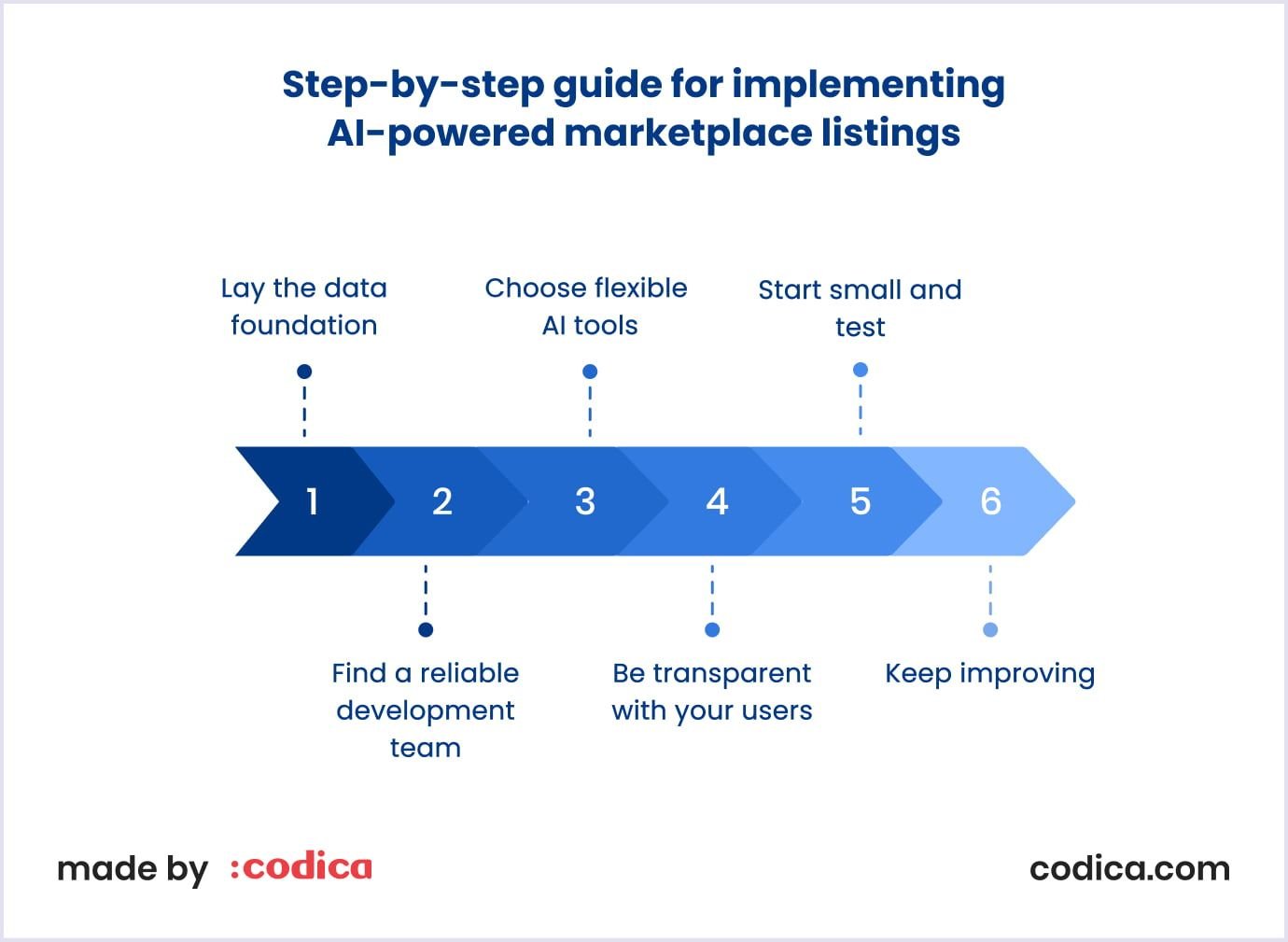
Step 1: Laying the data foundation
What to do? Scrape the right data about users' browsing habits, purchase history and preferences, as well as detailed product information. Clean and organize the data so that your AI can work on it effectively.
Why does it matter? AI is only as good as the data it's trained on. Clean, diverse data helps your system make better recommendations and avoid mistakes that frustrate your customers.
Step 2: Find a reliable development team
What to do? To implement AI-powered listings, you need a professional and experienced team beside you. At Codica, we’ve been delivering tailored marketplace platforms for more than 10 years, meeting the unique needs of every client. Our record speaks for itself: seamless integration, scalable solutions, and high-traffic platforms to deliver real results. Don't take our word for it: explore our portfolio to see how we've helped businesses like yours transform their platform and achieve success.
Why does it matter? Building and deploying AI systems requires deep technical knowledge. A trusted team will not only ensure your AI performs exactly as needed but will also save you from wasting time and making costly mistakes. Equipped with the right expertise, you can confidently integrate AI into your marketplace and focus on growing your business.
Step 3: Choose flexible AI tools
What to do? Determine which AI platforms will scale with your business. In general, cloud-based platforms, including AWS and Google Cloud, may be easier to scale over time as traffic and complexity increase. Make sure this works seamlessly with existing solutions.
Why does it matter? The larger your marketplace, the larger the demands placed on your AI system. Scalable tools ensure that you don't hit performance roadblocks and that you can scale up without headaches.
Step 4: Be transparent with your users
What to do? Tell users how AI works behind the scenes. For instance, explain to them why this or that recommendation comes up. Give them facile ways to tune their preferences and opt-out if they wish.
Why does it matter? If people can conceptualize how their data is being utilized, they are far more likely to trust your platform and have greater engagement if they feel like they're in control.
Step 5: Start small and test
What to do? Start small and focus on applying AI in a very specific domain, such as personalized product recommendations or price optimization for a very specific product category. Measure the results through well-defined metrics, such as sales or customer satisfaction, and adjust accordingly.
Why does it matter? Small-step testing lets you see what works without necessarily putting your whole marketplace at risk. It is a safer way to refine the system before full rollout.
Step 6: Keep improving
What to do? Regularly check how well your AI is working. Are recommendations on point? Is the system fair? Update it based on feedback, new trends, and your business’s evolving needs.
Why does it matter? AI isn’t “set it and forget it.” To keep it relevant and valuable, you’ll need to fine-tune it over time. Regular updates keep your platform fresh and user-friendly.
With these steps - and a trusted partner like Codica - you'll be well on your way to a successful implementation of AI-powered listings that will improve the customer experience and take your business to all-new heights.
Building or advancing your online marketplace with AI
Online marketplaces have grown way beyond mere listing of products. Today, success is all about personalization and efficiency. Studies have proven that an effective personalization strategy could lift revenues by 10 to 15%, or even up to 25%, depending on the sector and quality of the implementation. AI-powered listings lie at the heart of this change since such listings automate rich product descriptions, dynamic pricing, and recommend personalized options that enhance the experience of shoppers.
At Codica, we take care of committed online marketplace development services, maintaining the needs and expectations of the modern user in mind and keeping your platform competitive in the market. Whether it involves enhancing an already existing solution or building a new one, our expertise helps to design it for success.
We can review your platform to uncover possibilities for implementing AI-powered tools that elevate usability and performance. Let's shape the future of your marketplace together - contact us today.
